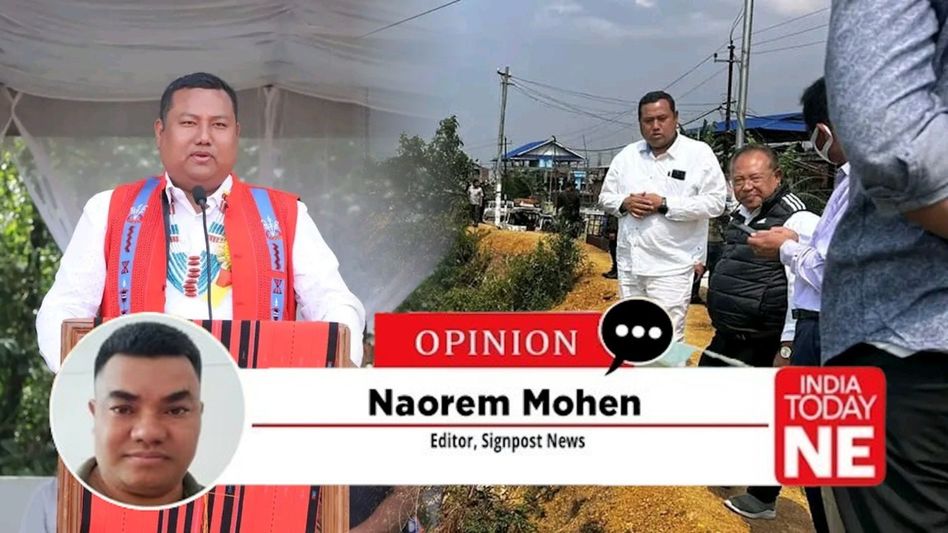Why Khurai MLA Yaima Deserves Applause, Not Memes
This man is speaking raw truth — the kind that most “educated” politicians are too scared or too polished to say. First, the rats issue: he didn’t just say “rats made holes”.

This man is speaking raw truth — the kind that most “educated” politicians are too scared or too polished to say. First, the rats issue: he didn’t just say “rats made holes”.
He said people throw garbage in river bank → rats get food → rats multiply → rats dig big holes → embankment becomes weak → small leak becomes big flood. It’s basic ecology + waste management issue, but he said it in village language, so city people laughed and called him illiterate.
Same people will write 500-word article on “anthropogenic factors contributing to embankment failure” and feel intelligent. Substance is exactly the same. He was 100% right.
Now this bureaucrats issue — even more on point. If an officer cannot pick up phone of an elected MLA (who carries votes of 30–40 thousand people), how the hell will he care about ordinary citizen?
During the President Rule's governance, a divide in empathy and accessibility among bureaucrats has come into sharper focus. While some senior officers remain detached from public grievances—often failing even to answer calls from elected representatives like Khurai MLA Leishangthem Susindro Meitei, known as Yaima—others demonstrate remarkable commitment. Deputy Labour Commissioner Tanushree Naorem, for instance, worked on a Sunday to hear the concerns of displaced private company staff, and DC Pooja Elangbam has made herself readily available to farmers in high-risk red zones.
Also Read: Deputy Labour Commissioner Probes Termination of Private Company Staff Amid Manipur Violence
Yaima’s criticism of certain “high-headed” officers who disregard courtesy and public accountability is therefore grounded in observable contrasts; it highlights not just lapses in protocol, but a broader question of whether those in authority truly see—and respond to—the pain of the people they serve.
His latest speech has once again set social media ablaze: bureaucratic officers who refuse to answer calls from elected representatives will “face the music” when a true people’s government returns. He cautioned that those who treat President’s Rule as a permanent license for arrogance will soon learn the consequences of their disdain.
This suggest a brutal, unvarnished truth—one that every ordinary Manipuri has tasted at some government counter. Yaima is not issuing threats; he is reminding a detached bureaucracy that democracy has a memory—and accountability is its sharpest edge.
In 2024, MLA Yaima was in Headline. It started with rats.“People throw garbage on riverbanks,” Yaima said to the media showing the heaps of garbages along the river bank. “Rats eat, multiply, dig tunnels. Tunnels weaken embankments. Water leaks. Flood.”
When the Imphal river swells like a wounded serpent, and entire localities vanish under chocolate-brown water, News anchors scream “climate catastrophe.” Few suggest "man-made" disasters. Engineers mutter about “embankment integrity.” Then a lone figure emerges from the deluge—shirt plastered to his skin, face streaked with mud, hands gripping the levers of a roaring JCB. Khurai MLA Yaima, digging drainage trenches, while some officers from the State Disaster Management Authority sips coffee in a flood-proof bungalow.This is not a campaign ad.
Picture this: Manipur’s riverbanks drowning in trash—plastic, rot, your last night’s curry. Rats throw a feast, breed like wildfire, then tunnel like tiny demolition crews. One burrow? A crack. A colony? A collapse. When Cyclone Remal hit in 2024, those holes turned embankments into sieves—floods swallowed homes, lives, hope.
Keyboards warriors cackled, memes exploded—Ratatouille MLA, Pied Piper of Imphal. But while they laughed, Imphal East drowned. Hooghly’s engineers nodded, dam experts agreed: rodent burrows do breach levees. Truth doesn’t need polish—it just needs you to stop tossing trash and start listening. Clean the banks, or the rats will keep writing the flood stories.
Once again, at yesterday’s inauguration of the Meitei Leima Village Level Federation office in Top Khongnangkhong, MLA Yaima pulled no punches: “Some officials have been looking down on legislators due to the absence of a popular government, even refusing to answer phone calls from MLAs. They seem to believe that elected representatives will not return to power. They will see—once normal democratic popular governance is restored.”
He did not threaten violence or vendetta. He simply reminded officers that an MLA’s phone call is not a personal favor—it is the collective voice of 30,000–40,000 voters trying to reach the state machinery.If a secretary, a director, or a deputy commissioner cannot spare thirty seconds to answer an elected representative, what hope does the common citizen have?
We have all stood in queues from 10 AM., clutching files, only to be told “Sir is in a meeting” while the officer scrolls Facebook Reels. We have all been asked for “tea money” to “move” a dusted file, a Domicile renewal or clearing due bill for supply orders. MLA Yaima’s warning is rooted in a historical truth. In democracies worldwide, when regimes change, the high-handed fall hard.
Officers who today treat President’s Rule as a personal fiefdom forget one immutable truth: postings are transient, but accountability endures. Let us be fair—not every bureaucrat is arrogant. Many pour their hearts into thankless hours amid ethnic clashes, floods, and blockades, quietly carrying pending relief-camp files home to process by lamplight after their own children are asleep, coordinating with exhausted IDP caretakers late into the night, or simply sitting with the displaced on a Sunday afternoon, holding space for stories of loss no form can capture, listening until the tears run dry.
These dedicated few deserve heartfelt salutes, not sweeping condemnation. Yet, a toxic minority persists—and they flourish amid institutional chaos. President’s Rule strips away political oversight, spawning vacuums where files mysteriously vanish, contracts balloon unchecked, and “percentage”—the unspoken cut of every deal—becomes the unwritten KPI, or Key Performance Indicator, the real metric of success in their shadowed world. These are the officers Yaima is calling out: the ones who mistake temporary authority for permanent privilege.
We elect MLAs to be our megaphones. When the megaphone is ignored, democracy is muffled.Yaima’s language may lack polish, but it carries the raw frustration of a state where governance often feels like a private club with “No Entry” signs for commoners.The memes will fade. Our social media timeline will be replaced by the next viral trend. But the rat holes will keep weakening embankments, and the high horses will keep trampling citizens—until we demand better.
Dare to Mock After This Challenge! To every meme warrior lounging on a relaxed sofa, Tea in hand: take the Yaima Challenge. Day 1: Walk into the Work Department and ask—without pulling strings—why your leikai road remains a cratered moonscape months after the rains. Day 2: Head to some Educational office to collect your long-delayed certificates; watch security guards openly demand “tips” just to let you submit the forms, and without that bribe, return day after day like a pilgrim circling a temple. Day 3: Apply for a new driving license, envelope-free, and watch the file gather dust. Return with your dignity intact, and the mockery might still hold. Most won’t. See, then, how those very officers treat you—the ones who ignore MLA Yaima’s call today.
Yaima is not asking for personal perks. He is asking for basic respect: for the voter, the process, the mandate.If that sounds funny, perhaps the joke is on a society that finds truth amusing only when packaged in perfect English.
Try to dial the number the babus ignore! Next time you laugh at Yaima, remember: the call he makes is the call you cannot. And the officer who ignores him today will ignore you tomorrow.That is not a meme. That is Manipur’s everyday reality.
Copyright©2025 Living Media India Limited. For reprint rights: Syndications Today









